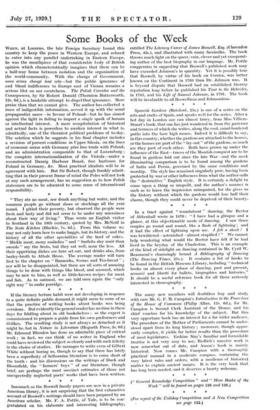Some Books of the Week
WHEN, at Loc.-arm, the late Foreign Secretary bound this country to keep the peace in Western Europe, and refused to enter into any parallel undertaking in Eastern Europe, he was the mouthpiece of that considerable body of British opinion which characteristically imagines that there can be a half-way house between isolation and the organization of the world-community. With the change of Government, nous arsons change tout cela—but the public ignorance of and bland indifference to Europe east of Vienna remains a serious blot on our escutcheon. The Polish Corridor and the Consequences, by Sir Robert Donald (Thornton Butterworth, 12s. 6d.), is a laudable attempt to dispel that ignorance. More praise than that we cannot give. The author has collected a mass of indigestible information, served it up with the usual propagandist sauce—in favour of Poland—but he has sinned against the light in failing to impart a single spark of human or intellectual interest. A mere recapitulation of historical and actual facts is powerless to awaken interest in what is, admittedly, one of the thorniest political problems of to-day. The solution which he suggests in his final chapter includes a revision of present conditions in Upper Silesia, on the lines of economic union with Germany plus free trade with Poland, and an administration comparable to that of Luxemburg ;
the complete internationalization of the Vistula—under a reconstructed Danzig Harbour Board, free harbours for Poland in Germany, &c. Most practical idealists will be in agreement with him. But Sir Robert, though frankly admit- ting that in their present frame of mind the Poles will not look at any such arrangement, has no suggestion as to how Polish statesmen are to be educated to some sense of international responsibility.


































 Previous page
Previous page